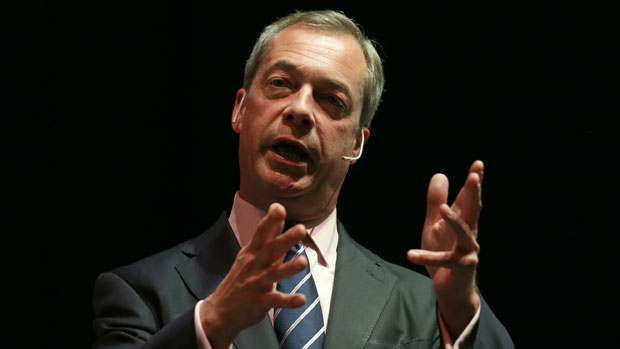Farage accused of 'bottling it' after saying No to Newark
But just because the Ukip leader isn't standing doesn't mean his party won't give the Tories a scare

UKIP leader Nigel Farage has been accused of “bottling it” after announcing on Radio 4's Today programme this morning that he will not stand as the Ukip candidate in the forthcoming by-election in Newark.
The East Midlands by-election follows the resignation last night of former Tory MP Patrick Mercer, who was banned from Parliament yesterday for six months over sleaze allegations.
Farage told Today presenter John Humphrys it would be a “massive distraction” from Ukip’s campaign to top the poll in the European elections on 22 May if he stood. But a BBC reporter claimed Farage had privately admitted being afraid of bursting the Ukip “bubble”.
The Week
Escape your echo chamber. Get the facts behind the news, plus analysis from multiple perspectives.

Sign up for The Week's Free Newsletters
From our morning news briefing to a weekly Good News Newsletter, get the best of The Week delivered directly to your inbox.
From our morning news briefing to a weekly Good News Newsletter, get the best of The Week delivered directly to your inbox.
Norman Smith, a BBC political correspondent, tweeted that Farage had told him in the hotel in Bath where he is on the campaign trail that the real reason he decided to duck out of the by-election contest was that “if he stood and lost - the bubble would burst”.
Farage came in for immediate ridicule on Twitter for “bottling it” again, just as he did at the Eastleigh by–election in 2013 when he declined to stand following the resignation of Lib Dem MP Chris Huhne.
John Prescott, the former Labour deputy prime minister, tweeted: "Nigel Farage Ale. Bottling it since Eastleigh." Tim Shipman, political editor of the Sunday Times, retweeted a picture of Farage sitting in a pub with a wine glass, but "no bottle".
Asked by Humphrys whether he would go for it, Farage said: "No, I am not. I have had 12 hours to think about this. We are three weeks away from the European elections in which I think Ukip has got a good chance of topping the polls and causing an earthquake in British politics.
A free daily email with the biggest news stories of the day – and the best features from TheWeek.com
"If I said I was going to stand it would be a massive distraction from that." He added that he had no real links with the East Midlands. "I would just look like an opportunist. I just don’t think it would work."
Humphrys said Farage would be accused of being “frit”, an old Lincolnshire phrase used by Margaret Thatcher in the Commons to accuse Labour of being frightened. Farage laughed it off: "I have been accused of many things in life but I don’t think that being 'frit' is one of them."
Nick Robinson, the BBC's political editor, said Farage’s enemies would use his decision to “bottle it” to damage him and Ukip’s appeal.
There are already signs of a media backlash against Ukip’s sudden rise in popularity and the extraordinary publicity enjoyed by Farage, the latest example being a feature in today's Guardian giving 'Ten reasons not to vote Ukip'.
However, the allegation made by Norman Smith that Farage has admitted that his party’s popularity is no more than a “bubble” that can be popped is potentially far more damaging than his decision not to stand. We shall see if it dents Ukip's popularity in the short term: the latest YouGov poll puts them ahead of all the major parties going into the European elections, but there are still three weeks to go.
In the meantime, just because Farage isn't standing in Newark, doesn't mean Ukip won't give the Tories a scare there.
Recalling Mercer's 16,152 majority at the 2010 general election, Tory Cabinet veteran Ken Clarke, whose Rushcliffe seat lies to the south of the Newark constituency, suggested on the Today programme that Farage had decided not to stand because he knew he didn't have a hope in such a rock-solid Tory seat. "Whatever else he [Farage] is, he is not an idiot. I don’t think they have a chance of winning Newark. I don’t think they will get anywhere."
But is Clarke being over-confident?
The sleaze allegations surrounding Mercer’s departure could well increase the number of Tory voters who are looking to make a protest. And Ukip are also stronger in the area than many realised: the party has two MEPs for the East Midlands: Roger Helmer, who defected from the Tories in 2012, and Derek Clark, who has shared the multi-member Euro seat since 2004.
Back in 2004, Robert Kilroy-Silk won the European election as a Ukip candidate in the East Midlands before quitting a year later to form Veritas.
Farage has promised to throw “the kitchen sink” at the Newark by-election. It could still hit David Cameron where it hurts.
-
 Why quitting your job is so difficult in Japan
Why quitting your job is so difficult in JapanUnder the Radar Reluctance to change job and rise of ‘proxy quitters’ is a reaction to Japan’s ‘rigid’ labour market – but there are signs of change
-
 Gavin Newsom and Dr. Oz feud over fraud allegations
Gavin Newsom and Dr. Oz feud over fraud allegationsIn the Spotlight Newsom called Oz’s behavior ‘baseless and racist’
-
 ‘Admin night’: the TikTok trend turning paperwork into a party
‘Admin night’: the TikTok trend turning paperwork into a partyThe Explainer Grab your friends and make a night of tackling the most boring tasks
-
 Three consequences from the Jenrick defection
Three consequences from the Jenrick defectionThe Explainer Both Kemi Badenoch and Nigel Farage may claim victory, but Jenrick’s move has ‘all-but ended the chances of any deal to unite the British right’
-
 The high street: Britain’s next political battleground?
The high street: Britain’s next political battleground?In the Spotlight Mass closure of shops and influx of organised crime are fuelling voter anger, and offer an opening for Reform UK
-
 Nigel Farage’s £9mn windfall: will it smooth his path to power?
Nigel Farage’s £9mn windfall: will it smooth his path to power?In Depth The record donation has come amidst rumours of collaboration with the Conservatives and allegations of racism in Farage's school days
-
 Is a Reform-Tory pact becoming more likely?
Is a Reform-Tory pact becoming more likely?Today’s Big Question Nigel Farage’s party is ahead in the polls but still falls well short of a Commons majority, while Conservatives are still losing MPs to Reform
-
 Nigel Farage: was he a teenage racist?
Nigel Farage: was he a teenage racist?Talking Point Farage’s denials have been ‘slippery’, but should claims from Reform leader’s schooldays be on the news agenda?
-
 Five takeaways from Plaid Cymru’s historic Caerphilly by-election win
Five takeaways from Plaid Cymru’s historic Caerphilly by-election winThe Explainer The ‘big beasts’ were ‘humbled’ but there was disappointment for second-placed Reform too
-
 Taking the low road: why the SNP is still standing strong
Taking the low road: why the SNP is still standing strongTalking Point Party is on track for a fifth consecutive victory in May’s Holyrood election, despite controversies and plummeting support
-
 The end of ‘golden ticket’ asylum rights
The end of ‘golden ticket’ asylum rightsThe Explainer Refugees lose automatic right to bring family over and must ‘earn’ indefinite right to remain